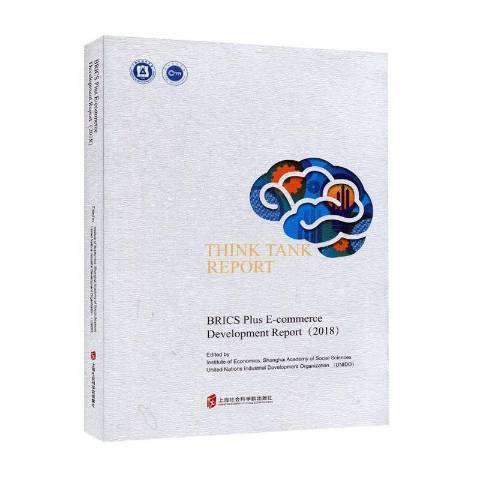《Brics plus e-commerce development report:2018》是2019年上海社會科學院出版社出版的圖書。
基本介紹
- 中文名:Brics plus e-commerce development report:2018
- 作者:上海社會科學院經濟研究所, 聯合國工業發展組織 主編
- 出版社:上海社會科學院出版社
- 出版時間:2019年
- 開本:16 開
- 裝幀:平裝
- ISBN:9787552029239
內容簡介,圖書目錄,作者簡介,
內容簡介
《金磚 國家電子商務發展報告(2018)》英文版,由上海社會科學院經濟研究所和聯合國工業發展組織(UNIDO)聯合編寫。
近幾年來,電子商務的快速增長令全球矚目,電子商務的發展對經濟和就業的作用及影響日益突出。本報告在完整分析電子商務的現狀和發展特徵的基礎上,探討了金磚各國及其他一些國家如高棉、衣索比亞、英國、墨西哥、奧地利在電子商務發展進程中面臨的問題及挑戰。在全球貿易標準和貿易協定談判日益複雜、利益衝突日益尖銳的背景下,報告也對這些國家如何促進電子商務和中小企業發展提出了政策建議。
圖書目錄
Part I Overview of Global E-Commerce
1 Current Status of Global E-Commerce
1.1 Current status of connectivity and ICT infrastructure
1.1.1 Current status of connectivity
1.1.2 Current status of ICT infrastructure
1.2 Current status of e-commerce
1.2.1 Business-to-business (B2B)
1.2.2 Online retail market (B2C and C2C)
1.2.3 Online-to-offline (O2O)
1.2.4 C2M (customer-to-manufacturer) and M2C (manufacturer-to-consumer)
1.2.5 New emerging e-business activities
1.3 Cross-border e-commerce
1.3.1 Market size
1.3.2 Regional distribution
1.3.3 Key players
1.3.4 Challenges
2 Global Trends in E-Commerce
2.1 Challenges to global e-commerce
2.1.1 Safety has become the main problem of e-commerce
2.1.2 The investment activity in global e-commerce shows a downward trend
2.2 Analysis of global e-commerce development trends
BRICS Plus E-Commerce Development Report (2018)
2.2.1 The global e-commerce development growth trend is at a turning point
2.2.2 E-commerce has become increasingly unbounded
2.2.3 The global e-commerce will gradually shift to emerging regional markets
2.2.4 Combining emerging technology, data drive and O2O to set up future models
2.2.5 Cross-border e-commerce will be greatly developed
2.3 BRICS e-commerce markets
2.3.1 BRICS countries are playing an increasingly important role in global e-commerce development
2.3.2 BRICS e-commerce will benefit from the increasing number of Internet users
2.3.3 The online retail transaction volume in BRICS countries is booming
Part II Country-Specific Analysis on E-Commerce
Development in BRICS Plus Countries
3 Brazil E-Commerce Development Report 2018
3.1 Current status of connectivity and ICT infrastructure
3.1.1 Internet penetration
3.1.2 Connectivity and connection speed
3.1.3 Fixed-broadband subscription
3.1.4 Mobile broadband subscription
3.2 Domestic e-commerce market
3.2.1 Trend analysis of sub-market in domestic e-commerce
3.2.2 Key players in the e-commerce ecosystem
3.3 Cross-border e-commerce
3.4 E-commerce regulation and law
3.5 Challenges and recommendations
3.5.1 Problems and challenges
3.5.2 Strategies and recommendations
3.6 Micro and SMEs (MSMEs) and e-commerce
3.6.1 MSME landscape in the country
3.6.2 E-commerce challenges for MSMEs
3.6.3 Existing support for MSMEs e-commerce activities
4 Russia E-Commerce Development Report 2018
4.1 Current status of connectivity and ICT infrastructure
4.1.1 Internet penetration
4.1.2 Connectivity and connection speed
4.1.3 Fixed-broadband subscription
4.1.4 Mobile cellular subscription
4.2 Domestic e-commerce market
4.2.1 Trend analysis of sub-market in domestic e-commerce
4.2.2 Key players in the e-commerce ecosystem
4.3 Cross-border e-commerce
4.3.1 Import/export statistics
4.3.2 Major trade partners
4.3.3 Business category and model
4.3.4 Cross-border-related issues and challenges
4.4 E-commerce regulation and law
4.4.1 Domestic e-commerce laws and regulations
4.4.2 Government policies and initiatives to support e-commerce
4.4.3 International trade agreement
4.5 Challenges and Recommendations
4.5.1 Problems and challenges
4.5.2 Strategies and recommendations
4.6 Micro and SMEs (MSMEs) and e-commerce
4.6.1 MSME landscape in Russia
4.6.2 E-commerce challenges for MSMEs
4.6.3 Existing support for MSMEs e-commerce activities
4.7 Outlook and policy recommendations of e-commerce cooperation among BRICS Plus countries
4.7.1 Common problems and challenges for BRICS Plus countries
4.7.2 Potential of e-commerce cooperation among BRICS Plus countries
4.7.3 Promotion of dialogue to improve the business environment
4.7.4 Facilitation of cross-border e-trade and the digital economy
4.7.5 Cooperation with international organizations to prioritize
e-commerce development needs
5 India E-Commerce Development Report 2018
5.1 Current status of connectivity and ICT infrastructure
5.1.1 Internet economy statistics-present and future
5.1.2 India’s drive for a cashless economy
5.1.3 Subscription data (as on September, 2017)
5.1.4 Connectivity and connection speed
5.2 Domestic e-commerce market
5.2.1 Indian e-commerce landscape
5.2.2 Trend analysis of sub-market in domestic e-commerce
5.2.3 New emerging e-business activities and strategies
5.2.4 Key players and associated technology theme
5.3 Cross-border e-commerce
5.3.1 Indian shoppers’ characteristics
5.3.2 Indian e-commerce companies have started to explore cross-border expansion plans
5.4 E-commerce regulation and law
5.4.1 Consumer protection
5.4.2 Payments
5.4.3 Contracts-validity of online contracts
5.4.4 Authentication and Identification
5.4.5 Privacy and data protection
5.4.6 IPR
5.4.7 Taxation
5.4.8 Equalization levy
5.4.9 Investment
5.4.10 Digital payments ecosystem on an upswing in India
5.5 Challenges and recommendations
5.5.1 Disruptions of existing business models often pose
significant perception challenges
5.5.2 Internet access limited
5.5.3 Growing competition
5.5.4 Security
5.6 Micro and SMEs (MSMEs) and e-commerce
5.6.1 SME landscape in India
5.6.2 Initiatives to support MSMEs
5.6.3 E-commerce challenges for MSMEs
..........
作者簡介
上海社會科學院經濟研究所成立於1956年,主要從事政治經濟學、西方經濟學、經濟思想史與經濟史、人口資源與環境經濟學、統計學與數量經濟學等基礎理論的研究。近年來,為順應國家高端智庫建設,經濟研究所注重學科建設和智庫發展雙輪驅動。60多年來,上海社會科學院經濟研究所云集了一批蜚聲學界的經濟學大師,形成了一批具有重要影響力的學術成果,打造了《上海經濟發展藍皮書》年度報告、《上海經濟研究》期刊等一批學術品牌。近年來,上海社會科學院經濟研究所加強同國內外學術機構、政府部門、社會組織和企業的交流,產出了大量決策諮詢成果。
經濟研究所於1981年獲得政治經濟學、中國經濟史、經濟思想史專業碩士學位授予權,1986年獲得政治經濟學博士學位授予權,2006年獲得理論經濟學一級學科博士學位授予權,並建有理論經濟學博士後流動站。
聯合國工業發展組織(UNIDO)(簡稱“工發組織”)成立於1966年,截至2017年12月31日,擁有168個成員國。作為聯合國的一個專門機構,工發組織一直致力於促進減貧、包容性全球化和環境可持續的工業發展。2013年,工發組織《利馬宣言》的通過和《2030年可持續發展議程》17項可持續發展目標的提出,賦予了工發組織新的使命,即推動成員國實現包容與可持續工業發展(ISID)以及可持續發展目標“建造具備抵禦災害能力的基礎設施,促進具有包容性的可持續工業化,推動創新”。目前,工發組織以創造共享繁榮、提升經濟競爭力和保護環境為宗旨,在農產工業和農村發展、貿易能力建設、質量基礎設施建設、促進技術交流與轉移、推動中小企業發展、促進性別平等、提高資源利用效率和低碳生產、推廣清潔能源、執行多邊環境協定等領域為成員國提供政策諮詢,開展廣泛的技術合作,為開發中國家和不已開發國家消除貧困,實現可持續發展作出了積極貢獻,促進了世界發展與共同繁榮。

